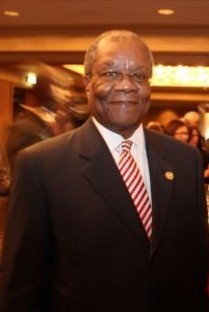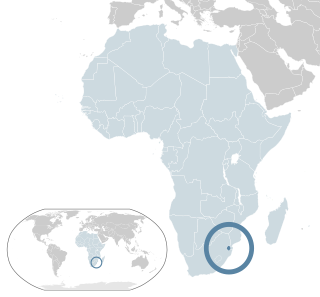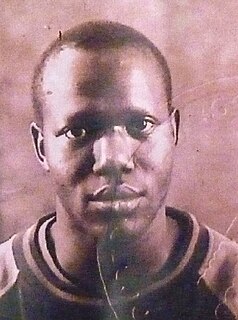Related Research Articles

Eswatini, officially the Kingdom of Eswatini, also known as Swaziland, is a landlocked country in Southern Africa. It is bordered by Mozambique to its northeast and South Africa to its north, west and south. The country and the Swazi people take their names from Mswati II, the 19th-century king under whose rule Swazi territory was expanded and unified.

This article is about the demographic features of the population of Eswatini, including population density, ethnicity, education level, health of the populace, economic status, religious affiliations and other aspects of the population.

Mswati III is the King of Eswatini and head of the Swazi Royal Family. He was born in Manzini, Eswatini, to King Sobhuza II and one of his younger wives, Ntfombi Tfwala. He was Tfwala’s only child. He attended primary school at Masundvwini Primary School and secondary school at Lozitha Palace School. From 1983 to 1986, he attended Sherborne School in north-west Dorset, England. He was crowned as Mswati III, Ingwenyama and King of Swaziland, on 25 April 1986 at the age of 18, thus becoming the youngest ruling monarch in the world at that time. Together with his mother, Ntombi Tfwala, now Queen Mother (Ndlovukati), he rules the country as an absolute monarch. Mswati III is known for his practice of polygamy and currently has 15 wives. Although he is respected and fairly popular in Eswatini, his policies and lavish lifestyle have led to local protests and international criticism.

The flag of Eswatini (Swaziland) was adopted on October 6, 1968 after Eswatini gained independence from the British Empire on September 6, 1968. The design of the flag is based on a flag given by King Sobhuza II to the Swazi Pioneer Corps in 1941.

The Swazi or Swati are a Bantu ethnic group of Southern Africa, predominantly inhabiting modern Eswatini and South Africa's Mpumalanga province. The Swati are part of the Nguni family that can be archaeologically traced in East Africa where the same tradition, beliefs and cultural practices are found. The Swati share a unique experience, culture and Royal lineage. This lineage is exclusive to the inhabitants of Eswatini, even though there have been more Swazi people that have moved to South Africa and the United Kingdom in the 20th century. The original inhabitants of Eswatini no longer reside in Eswatini as a majority population while some remain in the land. The Swazi people and the Kingdom of Eswatini today are named after Mswati II, who became king in 1839 after the death of his father King Sobhuza who strategically defeated the British who occupied Swaziland. The Kingdom of Swaziland was a region occupied by the San people of Southern Africa and the current Swazis came in from North Eastern regions through to Mozambique and eventually Swaziland in the 15th century. Mixtures with the San people and other Nguni tribes occurred. Their royal lineage can be traced to a chief named Dlamini I; this is still the royal clan name. About three-quarters of the clan groups are Nguni; the remainder are Sotho, Tsonga, others North East African and San descendants. These groups have intermarried freely. There are slight differences among Swazis as a nation with varying features and skin tones yet Swazi identity extends to all those with allegiance to the twin monarchs Ingwenyama "the Lion" and Indlovukati "the She-Elephant". The dominant Swati language and culture are factors that unify Swazis as a nation since there is no other language spoken except for English.
Swazi Express Airways was an airline based in Swaziland and owned by Steffen Air Charter Services.

Lobamba is the traditional, spiritual, and legislative capital city of Eswatini, seat of the Parliament, and residence of the Ntombi, the Queen Mother. Mswati III lives about 10 kilometres (6.2 mi) away at the Lozitha Palace. The King and Queen Mother participate in annual December and January Incwala ceremonies and August and September Reed Dancees at the Royal Kraal.

Manzini is a city in Eswatini, which is also the capital of Eswatini's Manzini Region. The city is the country's second largest urban centre behind Mbabane, with a population of 78,000 (2008). It is known as "The Hub" of Eswatini and lies on the MR3 road. Eswatini's primary industrial site at Matsapha lies near the town's western border.

Barnabas Sibusiso Dlamini was a Swazi politician who served as Prime Minister of Swaziland, from 1996 to 2003 and again from October 2008 to September 2018.
Articles related to Eswatini include:

Lesbian, gay, bisexual, and transgender persons in Eswatini face legal challenges not experienced by non-LGBT residents. According to Rock of Hope, a Swazi LGBT advocacy group, "there is no legislation recognising LGBTIs or protecting the right to a non-heterosexual orientation and gender identity and as a result LGBTI cannot be open about their orientation or gender identity for fear of rejection and discrimination". Homosexuality is illegal in Eswatini, though this law is in practice not enforced.

Sikhanyiso Dlamini is the current Minister of ICT of Eswatini and eldest daughter of King Mswati III of Eswatini.

Sipho Jele was a member of the banned Swazi political party People's United Democratic Movement (Pudemo) as well as the Swaziland Agricultural and Plantations Workers Union (SAPWU), part of the Swaziland Federation of Trade Unions (SFTU). He died in police custody in Swaziland, after having been arrested on 1 May 2010, at the SFTU May Day celebrations, for having worn a T-shirt with a Pudemo logo. Sipho Jele was found hanging from the rafters of a toilet at the Sidvwashini Correctional facility where he was being held on 4 May.

Eswatini, Africa's last remaining absolute monarchy, was rated by Freedom House from 1972 to 1992 as "Partly Free"; since 1993, it has been considered "Not Free". During these years the country's Freedom House rating for "Political Rights" has slipped from 4 to 7, and "Civil Liberties" from 2 to 5. Political parties have been banned in Eswatini since 1973. A 2011 Human Rights Watch report described the country as being "in the midst of a serious crisis of governance", noting that "[y]ears of extravagant expenditure by the royal family, fiscal indiscipline, and government corruption have left the country on the brink of economic disaster". In 2012, the African Commission on Human and Peoples' Rights (ACHPR) issued a sharp criticism of Eswatini's human-rights record, calling on the Swazi government to honor its commitments under international law in regards to freedom of expression, association, and assembly. HRW notes that owing to a 40% unemployment rate and low wages that oblige 80% of Swazis to live on less than US$2 a day, the government has been under "increasing pressure from civil society activists and trade unionists to implement economic reforms and open up the space for civil and political activism" and that dozens of arrests have taken place "during protests against the government's poor governance and human rights record".

In Eswatini, no king can appoint his successor. Only an independent special traditional Council called the Liqoqo decides which of the wives shall be "Great Wife" and "Indlovukazi". The son of this "Great Wife" will automatically become the next king.
The Republic of Singapore officially became the 117th member of the United Nations (UN) after its independence on September 21, 1965. From 2001 to 2002, Singapore held a rotational seat on the United Nations Security Council and has participated in UN peacekeeping/observer missions in Kuwait, Angola, Kenya, Cambodia and Timor Leste.
Swazi Airways was an upcoming Swazi airline based at King Mswati III International Airport in Manzini. It is the successor to Royal Swazi National Airways and is fully owned by the Swaziland Government. The airline had stated in September 2016 that it would commence flights in November, flying from Manzini to destinations in South Africa and Zimbabwe. It was closed down in July 2017.

Swaziland competed at the 2016 Summer Olympics in Rio de Janeiro, Brazil, from 5 to 21 August 2016. The country's participation in Rio de Janeiro marked its tenth appearance at the Summer Olympics since its debut in 1972. The delegation included two track and field athletes: Sibusiso Matsenjwa in the men's 200 metres and Phumlile Ndzinisa in the women's 100 metres. Both athletes participated at the Games through wildcard places since they did not meet the required standards to qualify. Neither athletes progressed past their heats, although Matsenjwa set a new national record.

Eswatini–India relations refers to the international relations that exist between Eswatini and India. The High Commission of India in Maputo, Mozambique is concurrently accredited to Swaziland. India also maintain an Honorary Consulate General in Mbabane. Swaziland does not have a diplomatic mission in India.
References
- ↑ "About Us". Swazi Observer. Retrieved 29 April 2014.
- ↑ United Nation. "United Nations Swaziland Media" . Retrieved 30 April 2014.
| This Eswatini-related article is a stub. You can help Wikipedia by expanding it. |
| This African newspaper-related article is a stub. You can help Wikipedia by expanding it. |